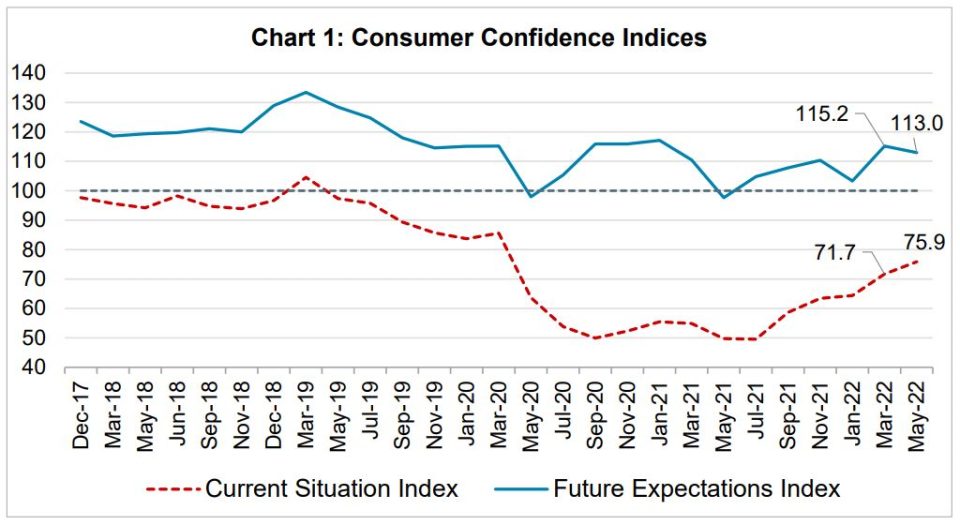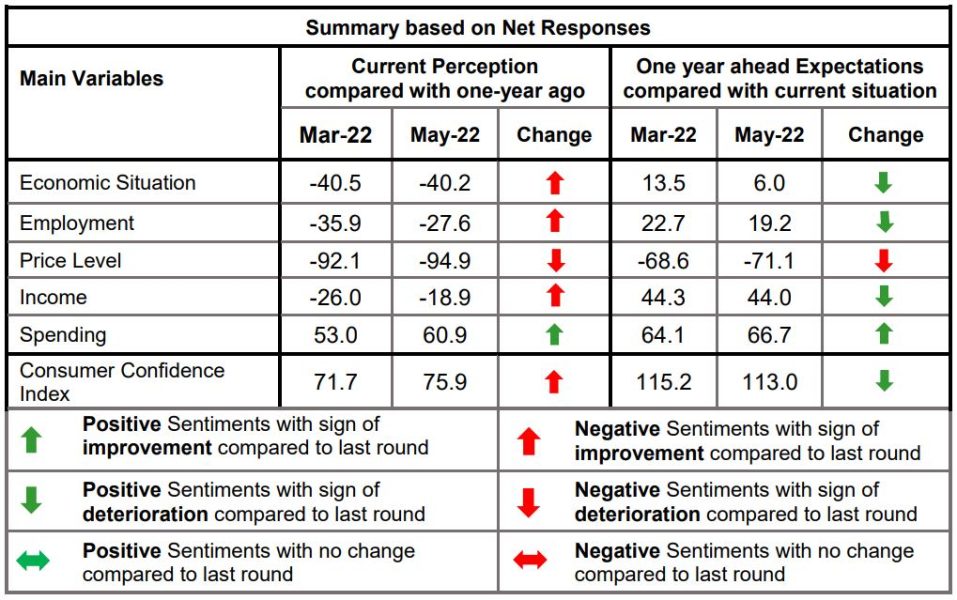
Consumer confidence improving but still in pessimistic zone: RBI survey

The Reserve Bank of India (RBI) has released the results of its Consumer Confidence Survey (CCS) for May which showed consumer confidence has consistently improved since July 2021. The sentiments on the key parameters like employment and household income improved further in the latest round of the survey, though they remained in the pessimistic zone.
“One year ahead outlook of households remained in growth terrain despite marginal moderation in sentiments. Households assessed a rise in their current spending and expected it to increase further over the next one year and they expected higher essential spending whereas the sentiments on non-essential spending remained downbeat,” the survey showed.
Also read: Experts’ take on repo rate hike: RBI has struck right inflation-growth balance
The consumer confidence index for May stands at 75.9, an improvement from 71.7 in March. However, it is still in the negative territory. This indicates consumers being with negative sentiments with sign of improvement compared to last year. The future price expectations index stood at 113 for May while in March it was 115.2.
If the consumer confidence index is below 100, then it is in the pessimistic territory while above 100 points to optimism.
Also read: RBI cancels licence of Mudhol Co-op Bank, Bagalkot, Karnataka
CPI inflation
After the Monetary Policy Committee (MPC) meeting on June 8, RBI had said, “Consumer Price Index (CPI) headline inflation rose further from 7.0 per cent in March 2022 to 7.8 per cent in April 2022, reflecting broad-based increase in all its major constituents. Food inflation pressures accentuated, led by cereals, milk, fruits, vegetables, spices and prepared meals. Fuel inflation was driven up by a rise in LPG and kerosene prices. Core inflation (i.e., CPI excluding food and fuel) hardened across almost all components, dominated by the transport and communication sub-group.”

“Inflation risks flagged in the April and May resolutions of the MPC have materialised. The projections indicate that inflation is likely to remain above the upper tolerance level of 6 per cent through the first three quarters of 2022-23. Considerable uncertainty surrounds the inflation trajectory due to global growth risks and geopolitical tensions. The supply side measures taken by the government would help to alleviate some cost-push pressures,” it added.
Also read: Businesses should avoid aggressive short-term reward-seeking culture: RBI Governor
The MPC noted that continuing shocks to food inflation could sustain pressures on headline inflation.
“Persisting inflationary pressures could set in motion second round effects on headline CPI. Hence, there is a need for calibrated monetary policy action to keep inflation expectations anchored and restrain the broadening of price pressures,” MPC said.
The survey obtained current perceptions (vis-à-vis a year ago) and one year ahead of expectations on the general economic situation, employment scenario, overall price situation and own income and spending across 19 major cities. The latest round of the survey was conducted from May 2 to May 11, covering 6,027 responses.

Households’ median inflation perception increases
In the May results of the Inflation Expectations Survey of Households (IESH) released by RBI, households’ median inflation perception for the current period increased by 40 basis points (bps) when compared to the March survey, whereas it increased by 10 bps and 30 bps for three months and one year ahead periods, respectively.

“Majority of the households expect general prices and inflation to remain high over three months and one year ahead horizons. Expectations for overall price and inflation over next one year were in sync with those for non-food products and cost of services, while three months ahead expectations were generally more aligned to those for food products and non-food commodities,” the survey results showed.
This survey too was conducted from May 2 to 11 in 19 major cities. The results are based on responses from 6,062 urban households, RBI said.

